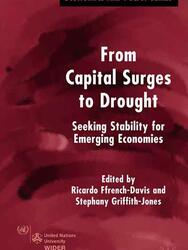'The project comprises of numerous other papers that researchers have contributed to this huge and far-impacting report, soon to be published as a book. It will provide an in-depth analysis of new trends in the supply of vehicles of capital flows and their determinants, as well as an evaluation of national policies to reduce volatility, which is basically a reflection of shortcomings in the countries' development process and the weakness of their mechanisms for regulating transactions that have opened the way for unusual financial crises in those systems.' - Roma Rana, United Nations Chronicle
'If one ranks subjects by the ratio of their importance to human welfare over the extent of understanding of them among the educated public, the subject of capital mobility and capital controls must come near the top of the list. This book is a marvellously lucid and accessible set of essays from some of the leading experts in the field - who unlike many other contributors to the literature, do not assume that what is best for finance is best for the whole economy and society.'- Robert Hunter Wade, Professor of Political Economy, Development Studies Institute, London School of Economics
'This book is outstanding in combining economic analysis with policy implications at the national and international level. It looks at capital flows to emerging markets from different perspectives and provides a comprehensive overview of problems, issues and possible solutions without getting lost in economic jargon. This seminal work must be read by anyone concerned about international development and the future of the world economy.' - Bernhard G. Gunter, EPIAM Project Director, New Rules for Global Finance Coalition, Washington DC
'This edition contains different contributions by well-known scholars on capital flows to emerging market economies. The book is a must read both for practitioners as well as academics interested in up to date analyses of the determinants and policy implications of capital flows to emerging markets since the Asian crisis.' - Robert Lensink, Professor in Finance and Financial Markets, Department of Finance, Faculty of Economics, University of Groningen
'The period following the Asian crisis has not only witnessed a big decline in the size of capital flows to emerging markets, but also a great deal of volatility in those flows. Ffrench Davis, Griffith-Jones and collaborators have produced an extremely useful synthesis of developments that have contributed to the decline and volatility in capital flows, with thoughtful analysis and generous statistics to support it. The attempts to redesign the international financial architecture need to pay careful attention to reforms by suggesting changes that both borrowers and lenders need to make. This book is a timely attempt to seek to address this vital issue by suggesting reforms that could be made to make recipient countries less vulnerable to global financial instability.' - Abdur Chowdhury, Chief Economist and Director, Economic Analysis Division, United Nations Economic Commission for Europe, Geneva
 Join the network
Join the network